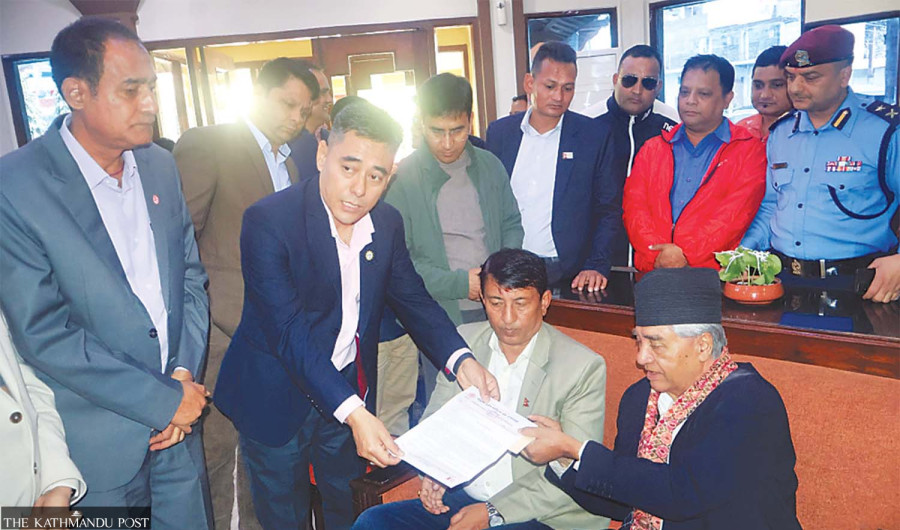On Tuesday, businessmen requested former prime minister Deuba to make efforts to operate the new airport.

A year and a half after the completion of the country’s second international airport in Bhairahawa in the southwest Tarai plains, the facility still stands empty.
Nepal has spent nearly Rs40 billion on the construction of an airport that does not receive scheduled flights.
Insiders say that the airport which was considered a landmark, and a sign of progress in this region before it was built, has geopolitical implications now and is potentially a “white elephant”.
On Tuesday, businessmen in western Nepal requested former prime minister Sher Bahadur Deuba to make efforts to operate the international airport in Bhairahawa.
They handed over a memorandum with a slew of demands to save the region’s ailing economy.
Their concerns are understandable. Since last year, many traders in Amar Path, Bikash Path, BP Chowk, Traffic Chowk and other areas in the Butwal city centre have closed their businesses. Many shuttered shops sport "To Let" signs.
“As the airport is not fully operational, industrialists and businessmen are forced to leave the town,” said Thakur Kumar Shrestha, president of Siddhartha Chamber of Commerce and Industry.
The objective of building the international airport in Bhairahawa was to bring more tourists, energise business and generate jobs. But the situation is just the opposite. Traders are closing down their shops and moving abroad for decent jobs.
The failure to operate the airport has badly affected the tourism industry and the economic activities in the region have come to a standstill, the members of the association told Deuba, who is also the chairman of Nepali Congress, one of the partners of the ruling alliance.
Gautam Buddha International Airport was the second international airport Nepal built after seven decades.
The once sleepy market town in the Tarai plains was thrust onto the international stage after becoming the gateway to Lumbini, the birthplace of Buddha.
Proliferating factories and a rapidly spreading transportation network turned the Butwal-Bhairahawa metroplex into an economic powerhouse.
Lumbini, which attracts international pilgrims as the birthplace of the Buddha, has observed the construction of large-scale infrastructure including a bevy of luxury hotels after talk about the construction of an international airport began in 2010.
On May 16, 2022, Nepal opened the international airport in the southern city of Bhairahawa but no international flights stop there.
Frantic traders say at least, the national flag carrier Nepal Airlines should operate flights from Bhairahawa.
Located in the central Tarai, the nearly Rs40 billion facility has been envisaged as the international gateway to Lumbini, the birthplace of the Buddha located 18 km from Bhairahawa. It has a 3,000-metre-long and 45-metre-wide runway.
Currently, Nepal Airlines flights coming from Kuala Lumpur make a touchdown at Bhairahawa every Tuesday before landing at Kathmandu’s Tribhuvan International Airport.
Traders, however, say that the touchdown of Nepal Airlines is only a face-saving stunt and does not contribute to trade and tourism.
The traders have demanded that Nepal Airlines connect Bhairahawa with New Delhi, India, Qatar and other countries.
The association has demanded regular or chartered flights from Bhairahawa connecting all the Buddhist countries to the birthplace of Buddha.
Similarly, the association has demanded to make at least 25 percent of the international flights departing from the Tribhuvan International Airport operate at Bhairahawa.
Businesses are shutting down as people are leaving for foreign countries for decent jobs.
Sagun Shrestha was forced to shut down his fancy store Kamal Enterprises in Butwal last year, a casualty of the coronavirus pandemic.
He had opened the shop on Nepalgunj Road before the Covid pandemic when business was going great.
“From dawn to dusk, my store was always packed with customers. I used to supply clothes to traders in nearby districts like Palpa, Arghakhanchi and Gulmi too,” Shrestha told the Post in a recent interview.
Business started slowing down after Covid spread through the world and reached Nepal. But he was hopeful that the situation would improve after the pandemic ended.
The improvement he had hoped for never happened. Last year, he decided to shut down his store.
The sole breadwinner of the household says he is anxious about the future.
The pandemic precipitated a devastatingly sharp contraction of economic activity and huge job losses globally in early 2020.
Nepal’s economy shrank to a record low in 2020-21.
After making a strong rebound in 2021-22, growth again took a hit in the last fiscal year on a tighter monetary policy, higher international prices and continued import restrictions.
There was a large boom-bust credit cycle in Nepal’s financial sector. This means credit may have grown to excessive levels and borrowers' repayment capacity eroded due to higher lending rates.
Shrestha's business started to suffer as he was selling goods on credit and paying high bank interest. He said a majority of his customers didn’t pay their debts.
“Because of the high interest and steep rentals, I had no choice but to shut down,” said Shrestha.
Ramu Adhikari had spent Rs1.2 million to open Arghakhanchi Mobile Store in ward 11 of Butwal Sub-metropolis. He is another victim of the economic slowdown.
Last June, Adhikari held a clearance sale to sell off his entire inventory and shuttered his shop.
Deuba said that he is positive towards the demands of the businessmen and will take necessary initiatives to bring the airport into full operation.
Businessmen, however, say they have heard of such pledges for months, but they never translated into reality.












